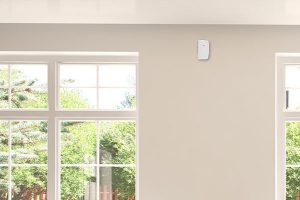Your cart is currently empty!
Category: General
-

Do You Need Glassbreak Sensors?
Glass breaks can be an important addition to your home security system.
Glass breaks are sensors that detect the sound frequency and percussion of glass breaking and send the signal to your home security system to activate the alarm.So why would you need glass break sensors installed as a part of your security system if you already have door and window sensors?Door and window sensors are only effective if the door or window is opened. If an intruder instead decides to break the glass of the window to enter your home, the window sensor won’t trigger the alarm. A glass break sensor will trigger the alarm when it detects the sound and vibration of the glass breaking.
Should you add glass breaks to my security system?
It’s important to remember that glass break sensors are used to enhance the security system you already have in place to make it even more effective.We would suggest glass break sensors for any home that features:
- Large windows
- Sliding glass doors
- Rooms with many windows, such as sun rooms
- Exterior doors with windows or decorative window panes
- Homes with windows that are painted shut
While homes with large windows provide extra sunlight and views, they’re also a potential target for would-be criminals. Glass break sensors can help protect you in the event a criminal tries to enter your home.
-

The Best Home Security with Pets in the House
Security technology has gotten so advanced that pet owners don’t need to be too concerned about false alarms much these days.
You can design a security system with everyone in your home in mind, including your pets:
Pet-Friendly Motion Sensors
Nothing is more frustrating than leaving your house and arming your security system, only for your pet to set off the motion sensors. That’s why, if you have pets, it’s crucial to get a home security system with pet-friendly motion sensors. This way, your pet can roam freely through the house without triggering your alarm.
Security Cameras
Any camera can help you to monitor your pets, but who has time to watch a live stream all day? Make sure that the security system you choose has cameras with the mobile app so you can receive customized alerts regarding your pet. Wi-Fi cameras are great for this because you can move them around your home as needed. One time we left to go on vacation and placed the indoor camera right by our cat’s bed. We got to see him and talk to him any time we wanted.
24/7 Monitoring with Pets
If you have an EMC Security monitored system, you can add the details of your pets to your account. By doing so, you’re allowing emergency responders to automatically receive information about your pets’ presence when they respond to an alert about your home. This information makes a pet rescue that much more possible.
This is particularly important for fire monitoring. You want the responders to know where the pets are so they can get them to safety immediately upon entering a burning building.
Smart Door Lock
A smart door lock is a fantastic product for those who have a dog walker come to their house while away. Giving your dog walker a key to your home or leaving a key under the doormat is risky. The EMC Security Smart Door Lock allows you to create a unique code for your dog walker to use when they need to enter. You’ll receive alerts whenever they come and go.
DIY Installation
Have a pet that is anxious around strangers? When a professional installer comes into your home, your pet may get upset, so a home security system with DIY installation may be your best bet. With DIY installation, the equipment is easy to set up and does not require drilling. In fact, no tools are needed at all. Plus, you save money with a self-install system from EMC Security.
-

Too Many False Alarms? We Can Help
There are many reasons why security system users have false alarms. For instance, a large proportion can be blamed on homeowners forgetting to disarm the system prior to letting the dog out or empty the trash. Another aspect could be entering the wrong passcode.
Some municipalities in Georgia have cracked down on false alarms, with fees. EMC Security has implemented EMC Text-Alert, a text notification service that gives you the opportunity to chat with your emergency contacts when your alarm is triggered and respond appropriately from your phone. We’ve seen a significant reduction in false alarms when customer use Text-Alert. IT’S FREE! Sign up here >>

More ways to reduce false alarms:
Before you activate your system:
- Lock all protected doors and windows.
- Educate family members on
alarm system and usage. - Contact EMC Security if you have any concerns about the proper
functionality your system. - Notify EMC Security if you plan any renovating or remodeling your home.
- Educate family members on what to do if your alarm is accidentally triggered.
- Use the EMC Text Alert app to chat with your emergency contacts when your alarm is triggered and respond appropriately from your phone.
- First, don’t panic, there is time. Enter your disarm code (carefully) to reset your system. Remember, if there were a burglar, he or she would not know your code. Do not write it on your keypad.
- Call EMC Security at 1-888-745-4733 or wait for us to call you. Give your password — this is different from your disarm code.
Commercial False Alarm Prevention Guide
- Be sure all employees are thoroughly trained before attempting to use the alarm system. Hold monthly training sessions.
- Look for items that can move within the “view” of your motion detectors, causing false alarms fans, heaters, hanging signs, seasonal decorations, balloons, curtains, plants, etc.).
- Confirm that special consideration has been given to the installation of motion detectors in high traffic areas with overhead doors, large exhaust fans or ceiling vents which allow the entry of birds.
- Ensure all doors and windows are secure and locked before arming your system.
- Don’t change pass-codes without advising EMC Security.
- Train new users thoroughly, notifying EMC Security of new users.
- Service and maintain your system (including batteries) regularly before false alarms occur.
- Upgrade old alarm systems to current equipment conforming to Security Industry Association (SIA) false alarm prevention standards, further reducing false alarms.
Every municipality in Georgia has alarm registration requirements. Some have false alarm ordinances as well. Make sure you understand your ordinance and fee guidelines before installing a security system in your home or business.
-

Home Security App Protection
One of the most convenient features of modern security systems is the mobile app. Since the app has the ability to arm and disarm your system, view camera video, and control other home functions, it’s important to keep it secure with protection from hackers.
Below are ways to protect your privacy while using a home security app:
- Connect to a trusted Wi-Fi network to keep your home security system information and events private from the public. If you’re not connected to a secure network, there’s a high risk of a stranger using public Wi-Fi to get your private home security information.
- Most security apps allow you to share access with other family members. Consider limiting app access only to those who need it.
- Change your password frequently. If your app allows, use two-factor authentication to log-in two ways to access your account. The extra layer of security helps prevent hackers from accessing your account with only a password and email.
- Keep your mobile app up to date. Anytime your app has an update available make sure to download the latest as soon as possible. App updates often include bug fixes, security and privacy improvements.
-
Warning About Alarm Monitoring
Many alarm monitoring companies, including large national companies allow central alarm station operators to work from their homes, apartments or even college housing dorms to monitor customers for life safety events. Seems almost unbelievable, but it is a fact.
A recent article by security industry expert Jeff Zwirn, published in industry trade magazine Security Sales and Integration highlighted a change that was made to an important UL code made during the Covid 19 pandemic. The new UL-827 now allows operators to perform their life safety and property protection dispatch duties from anywhere they have an internet connection. This includes private homes, apartments, or other locations.
Any good central station operation will be backed up for power and will have redundant internet connectivity paths. Operators and their actions will be closely monitored for activity. Visitors, cell phones, TVs are generally not allowed in the facility, due to concerns about security, privacy, and distraction.
Zwirn warns, “Central Stations that have their operators working from their apartments, dormitories, or homes is a choice that is foreseeably dangerous and needlessly puts subscribers at an increased risk of the very things that the alarm system was intended to protect against as reliable and timely emergency dispatch.”
When this UL guideline change was made, EMC Security decided that remote alarm monitoring was not a practice that we would support. Distracted operators, lack of oversight and supervision, risk of a data breach and virtually no redundancies for the operators make the notion of remote monitoring very scary.
EMC Security’s central station operates 3 locations with in-facility alarm response, never compromised by security risks, distractions, or weather. All monitoring center locations are staffed with highly trained and certified response staff, in secured facilities, backed up by multiple generators and multiple communication paths. No alarm monitoring staff works from home. Ever. We do not put our customers at risk by allowing operators to monitor remotely.
We do not put our customers’ safety at risk for the comforts of working from home. We stand by our decision to utilize in-facility monitoring centers because we believe that upholds our dedication to providing the highest level of customer service in a distraction-free, secure environment.
In addition, EMC Security has a redundant monitoring location in a secured facility, on site at our office in Suwanee, backed up by multiple generators and multiple communication paths. Low priority signals (battery, power, etc) are handled from this location, but it is ready to handle all alarm conditions, if necessary. No operator handles any priority, high response life safety and property protection signal from anywhere outside of our facility.
-

Home Security Rates Increasing?
The reality of the world-wide microchip shortage, global labor shortage and other supply chain disruptions has manufacturers – from consumer electronics and appliances to automobiles and industrial capabilities – in a bind trying to fulfill demand. Simple economics proves that when demand is high and supply is low, prices go up. It’s happening in every aspect of our lives.
Security technology manufacturers have announced hefty prices increases this year. Home security companies all over the U.S. are facing price increases and are passing the cost to consumers.
EMC Security has a plan to protect our low prices.
- Internally, our team is negotiating exemption and/or lower percentage increases with our manufacturing partners.
- Our famous “no contract” option provides more value to consumers than ever before. We give our customers control to decide if they want to do business with us. Because customers can cancel any time, we work hard to ensure our level of customer service is at its highest for each and every interaction.

- EMC Security protects our customers and gives back to the community we serve.
- As a local company, we hire local people to service local families and businesses – we are part of this community and we do all we can to buy local and support the community.
- Every employee passes background checks, drug screens, and driving records.
- We notify customers if we don’t receive a test signal in more than 30 days. Customer security systems are tested for signals to confirm the system is properly functioning. Other companies don’t provide regular testing like this.
- We employee a team of 7 in-house technical support representatives. Trained security technicians are available at no cost to our customers to provide telephone technical support. This could save our customers time and money associated with a site visit to trouble-shoot or repair their system.
- Free EMC Text-Alert is a service no other company offers at no cost. This service allows customers to make a decision quickly with those on their contact list whether to dispatch or cancel an alarm – speeding up the process.
-

EMC Security Can Activate Your Security System
More homes than ever before have pre-installed security systems, or the home is pre-wired and ready for security equipment to be installed.
This begs the question that is often confusing to consumers, “Do I have to use the company that installed the equipment to monitor it?”
No, you don’t.
With just a few exceptions, EMC Security can monitor most existing home security systems. This is good news if you’re happy with the existing security system in your home but dissatisfied with your current monitoring service, or especially if you’re moving into a home with a pre-installed system.
What is Monitoring?
When your alarm is activated (by a sensor striking on a door or window), an alarm is sent to the central monitoring station for immediate action. This includes contacting you at pre-determined phone numbers (EMC Security’s alarm response is less than 14 seconds on average) and relaying your address and the type of emergency to police, fire, or medical authorities.
Some systems are only supported by the company that installed them. These systems are called proprietary systems. Some well-known companies block other companies from monitoring their systems with proprietary systems. However, there are many other system types that are non-proprietary which makes choosing a monitoring provider much easier.
If you’re moving into a home with an existing security system, the control panel should give you a make and model number to assist with your research. This information is all EMC Security needs to determine if we can monitor your system.
How to Switch to EMC Security
As part of our process of activating an existing security system, our customers receive:
- A full system diagnostic
- Reprogramming to communicate to EMC Security monitoring centers
- Full system communications test
- Panel battery replacement if needed
- Homeowner training on full system operation
- Yard signs and window decals

-

Google and Alexa Security Controls
EMC Security’s newest wireless systems, Connect+, give customers the convenience to arm and disarm the system using Alexa or Google Home.
How to use Amazon Alexa with Connect+
The Alula Alexa Security Skill allows users to operate theConnect+ securitysystem with voice commands through their Alexa-enabled devices.
To get started first add Alula to your Alexa by installing the Alula Skill.
1. Download and Open the Alexa application on your smartphone.
2. Select “Skills & Games” from the slide out menu on the left of the screen (tap the 3 parallel lines on the top left corner to expose menu)
3. Search for “alula” without quotes. Tap the Alula app from the list that appear then tap “Enable” to add the Alula Skill to your Alexa.
4. Sign in with your Username and Password that you use with the Alula app.
Once Skill is added Alexa will now be able to react to the “My Security System” command. The basic pattern is to say “Alexa, ask/tell My Security System to…” Some specific example as are as follows.
-
- Alexa, ask My Security System to arm to stay.
- Alexa, tell My Security System to arm to away.
- Alexa, tell My Security System to arm to night.
- Alexa, ask My Security System for status.
- Alexa, ask My Security System to disarm using 1,2,3,4 (you may use any valid code for your panel).
How to use Google Home with Connect+
Install the Google Home app for iPhone or Android
Press the “+” symbol in the upper left
Click “Set up a device”
Choose “Set up new device”
Choose “Have something already set up?”
Scroll down to “Alula Security” and click it
Sign into your Alula account with your Username and Password
You’ll see a list of all your Smart Home devices.
Click on all of the Smart Home devices you want to add.
Navigate back to the home screen and find the microphone button in the bottom middle of the screen.
Press the microphone button and speak to enter Google Home commands for your Smart Home devices.
You can say phrases such as:
- “Set my Connect Plus to stay”
- “Set my security system to stay”
- “Set my security system to away”
- “Set my security system to night”
- “Disarm my security system” (Google will ask you for the pin)
- “Disarm my Connect Plus” (Google will ask you for the pin)
- “Is my system armed?”
- “Is my Connect Plus armed?”
- “Is my front door open?”
- “Are my doors open?”
You can give other household members access to the connect plus in two steps
- Make sure connect plus and sensors are added to a “home” in the Google Home App
- Use the Google Home App toinvite home member to the “home”
-
-

Should I Add Glass Breaks To My System?
Glass breaks can be an important addition to your home security system.
Glass breaks are sensors that detect the sound frequency and percussion of glass breaking and send the signal to your home security system to activate the alarm.
So why would you need glass break sensors installed as a part of your security system if you already have door and window sensors?
Door and window sensors are only effective if the door or window is opened. If an intruder instead decides to break the glass of the window to enter your home, the window sensor won’t trigger the alarm. A glass break sensor will trigger the alarm when it detects the sound and vibration of the glass breaking.
So the question remains:
Should I add glass breaks to my security system?
It’s important to remember that glass break sensors are used to enhance the security system you already have in place to make it even more effective.
We would suggest glass break sensors for any home that features:
- Large windows
- Sliding glass doors
- Rooms with many windows, such as sun rooms
- Exterior doors with windows or decorative window panes
- Homes with windows that are painted shut
While homes with large windows provide extra sunlight and views, they’re also a potential target for would-be criminals. Glass break sensors can help protect you in the event a criminal tries to enter your home.
Learn more about security system components here.
-

Kids Home Alone? Introduce Them to Home Security
The effectiveness of your home’s security system relies on those who use it – and that includes your children.
If your children are old enough to be left home alone, use these tips for introducing them to home security and personal safety.
1. Make Sure They Are Ready
It is one thing for your child to operate your home security system while you’re there, but it’s totally different from when you are away.
Making sure your child is mature enough to use the system on their own is an important question of consideration. Most kids are left at home alone starting around age 12 or 13, but that doesn’t mean your child ready to handle the responsibility.
Your children should be able to interact with the home security system (arming it and disarming it) and be able to take care of themselves while they are at home alone.
2. Have a Training Session
Schedule time to train your child on the home security system. Make it exciting and avoid drawing out the process for too long.
Let your child know the purpose of the home security system (protecting your home and family), but keep the conversation positive and do not frighten or intimidate them.
3. Test It Out
After you’ve covered the steps of arming/disarming your home system with your child, test it out. Over the course of a few days, have them take charge of arming and disarming the system while under your supervision to make sure they know how to operate it.
Children can remain at home safely with a home security system. However, not all security systems are created equal.
If you are thinking about leaving your kids at home alone, consider updating your current home alarm to one that is kid-friendly and simple to use. An EMC Security professional can help you pick out the right alarm system for the entire family.
Learn more about teaching your children to use your home security system by contacting EMC Security. Need to purchase a home security system? Call today at (770) 963-0305 or visit us online www.emcsecurity.com.





